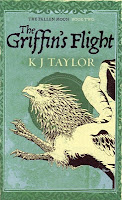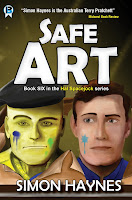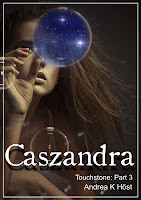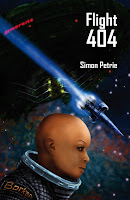The Indigo Spell. This is going to be a short review because it's new year's eve, not a review copy and if you've read the first three, you've probably already decided whether you're going to pick up the fourth. If you haven't read the first three, the blurb (and the rest of the review) is made of spoilers, so go do that instead.
Sydney Sage is an Alchemist, one of a group of humans who dabble in magic and serve to bridge the worlds of humans and vampires. They protect vampire secrets - and human lives.This one had a lot more romance in it than the previous books. For whatever reason (most likely that I didn't spend much time pondering the events of the previous book before beginning), this came as a bit of a surprise. It was was interesting, however, to watch the shift in dynamic between Sydney and Adrian. Allowing herself to date a vampire was always going to be a big deal for Sydney, but Mead doesn't forget to highlight the Adrian's emotional shift either.
In The Indigo Spell, Sydney was torn between the Alchemist way of life and what her heart and gut were telling her to do. And in one breathtaking moment that Richelle Mead fans will never forget, she made a decision that shocked even her. . . .
But the struggle isn't over for Sydney. As she navigates the aftermath of her life-changing decision, she still finds herself pulled in too many directions at once. Her sister Zoe has arrived, and while Sydney longs to grow closer to her, there's still so much she must keep secret. Working with Marcus has changed the way she views the Alchemists, and Sydney must tread a careful path as she harnesses her profound magical ability to undermine the way of life she was raised to defend. Consumed by passion and vengeance, Sydney struggles to keep her secret life under wraps as the threat of exposure — and re-education — looms larger than ever.
Speaking of Adrian... this paragraph is going to be a bit ambiguous because I want to avoid spoilers. The approach Adrian (and co) takes to deal with his spirit-use side-effects turned out to be more thought-out than I expected. Although I do wonder what will happen with that in the sequel(s) since the ending did rather leave things up in the air.
Speaking of the ending, it was rather disheartening. I'm not sure I'd quite call it a cliff-hanger, since the book went on just long enough to let us know what was happening (rather than leave us guessing). But it definitely did provide a strong "golly, how will they fix this?" situation. I definitely want to know what happens next, and I'll definitely be getting my hands on the next book, Silver Shadows, which Goodreads says will be out in July 2014.
A recommended read for fans of the series. If, for some reason, you got through this review without having read the earlier books, don't start with this one, start with book one, Bloodlines. Fans of not-standard-vampire YA should enjoy this series.
4.5 / 5 stars
First published: November 2013, Penguin
Series: Bloodlines, book 4 (of, if I had to guess, possibly 6 like the Vampire Academy books)
Format read: paperback
Source: Purchased from Dymocks




















































